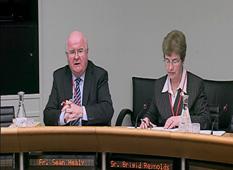Welfare State faces difficult future

It may take the country three to five budgets to “get back to normal”, a Green Party Senator said yesterday. In the meantime, the welfare state faces serious challenges.
Financial turmoil and economic slowdown will continue to exert a great deal of pressure on public social expenditures, a conference heard yesterday. In his presentation on the future of the welfare state, Prof. Tony Fahey of UCD also cited long-term factors such as an ageing population and high levels of unemployment as difficulties facing the welfare state.
Speaking at Social Justice Ireland’s (SJI) annual conference, Prof. Fahey also highlighted the resilience of the welfare state and he said that although the welfare state would continue in the future it could well be regressive rather than progressive. He pointed out that those who benefit from public support for “private healthcare, private pensions, and owner-occupied housing, typically strive to maintain public subsidisation of those services through the tax system and resist attempts to reform such subsidies in a more progressive direction.”
In a paper addressing the challenges faced by the welfare state, SJI directors Seán Healy and Bridget Reynolds emphasized the danger that the welfare state in the years ahead “may support only middle-class and better off people” leaving the poorest in our society at risk. They looked at challenges such as the long-term fiscal sustainability of the welfare state, commenting that further financial crises are a possibility if international regulatory systems are not put into place.
As well as this, they considered whether or not the welfare state can be sustained in the current political climate saying, “The government washes its hands of any responsibility once a certain amount has been allocated. The service provider on the frontline is left facing those who need a service but without adequate funding.” Healy also said that the position of the welfare state in political debate is now being challenged by other issues which have come to the fore in recent years such as the world banking crisis and climate change.
Healy and Reynolds also tackled two key issues concerning the development of a 21st century welfare state; the question of financing and the need for shared social responsibility. With regard to the former, they spoke about the need for transparency, finding alternatives to raising taxes, and eliminating disincentives to taking up paid employment. In terms of shared social responsibility, Healy said that the poor and the vulnerable have suffered most as a result of the financial crisis despite bearing the least responsibility for it.
Dr. Willem Adema of the OECD’s Social Policy Division presented a paper analysing the welfare state across OECD countries, its cost and its effectiveness in reducing poverty. Drawing on figures from 2007, he showed that Ireland spends less of GDP on social expenditure than other OECD countries. However, he also pointed out that the percentage was set to increase due to a sharp decline in GDP and rising unemployment estimating that by 2011 social expenditure would account for 20% of gross domestic product, compared with 16.2% in 2007 when the OECD average was 20.1%. Dr. Adema concluded that as social expenditure cuts were inevitable in the present climate, the challenge will be “to cut smartly and spend wisely.” Comments from the floor drew attention to the difficulties in using GDP* as an accurate measure of progress, which was the subject of last year’s conference.
During the Political Round Table, Labour spokeswoman on social protection Rósín Shortall emphasized the need to develop public services which, she said, the government had failed to do during the boom years. She also stated the importance of job creation, a sentiment echoed by Fine Gael’s Michael Ring who spoke about the need to overhaul FÁS and direct people to suitable education and training in order to upskill. In relation to the current welfare system, he said there was too much bureaucracy which left ample room for mistakes and fraud. Green Party Senator Dan Boyle emphasized that the next budget would not solve our problems and that it would take three to five budgets to “get back to normal”. He said there were no easy solutions to the financial problems facing the State where €2 out of every €5 given in social welfare payments is borrowed.
The full texts of all the papers presented at yesterday’s conference are available here.
*Gross National Product is the value of all final goods and services (or income) owned by (accruing to) the residents of a country in a year. Gross Domestic Product is the value of all final goods and services (or income) produced domestically in a year, regardless of the nationality of the owners of the factors of production. Because of the heavy presence of multinationals in Ireland, GDP is typically 15 - 20 per cent higher than GNP, so GNP is a more realistic measure of economic production.
